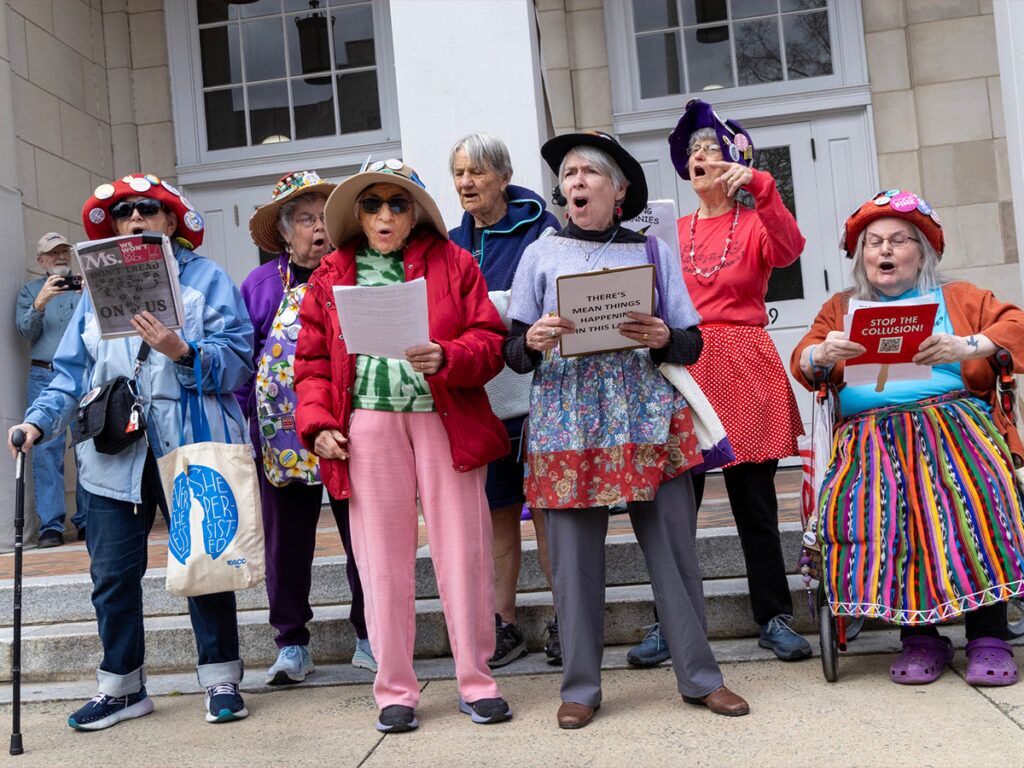
Can John Fetterman Continue in the Senate?
May 2, 2025
Movie Theaters as Communal Spaces
May 2, 2025Founded in Canada in the 1980s, the Raging Grannies have “gaggles” around North America—and plenty to sing about.
Originally published in Indy Week on April 21, 2025.
Even in a crowd of thousands, they’re instantly recognizable by sight and sound: silver-haired women wearing colorful aprons and floppy hats, brandishing cardboard signs and sheafs of lyrics, singing acerbic protest songs set to cheerful nursery tunes.
“We were angry when you raised all those taxes on the poor / We were outraged when you authorized those pipelines / Our infrastructure’s gone to pot, and our grandkids are getting shot / So we’re raging, ’cause now you’ve pissed off Grandma!”
The Raging Grannies originated in Canada in 1987, following the Chernobyl nuclear power plant explosion the year prior. The Grannies’ first-ever protest, staged on Feb. 14 in Victoria, British Columbia, involved an umbrella punched through with holes—a dig at the idea of protection beneath a “nuclear umbrella”—and a broken-hearted “Un-Valentine” delivered to an unsympathetic member of parliament, accompanied by a satirical lullaby.
Today, there are more than 50 groups of Grannies (gaggles, in their vernacular) spread across Canada and the United States. They protest peacefully against injustices in their communities and farther afield, from war to political corruption and environmental degradation. The gaggles operate independently of each other but share song lyrics and a penchant for loud, gaudy outfits.
“We’re mocking the stereotype,” says Vicki Ryder, who joined the Triangle Raging Grannies more than a decade ago and is one of the group’s most prolific songwriters. “We’re gonna look like what you think grandmothers look like, but when we open our mouths, we’re gonna make you sit up and take notice.”
It didn’t start with Trump and it’s not going to end with him. Getting rid of Trump is not going to get rid of the problem.
Vicki Ryder
Long before Ryder became a Raging Granny or moved to Durham, she was the school-aged daughter of activist parents in New York.
“When I was born in ’42, my parents named me Vicki for a quick victory over fascism,” she says. “From the day I was born, it was my job to fight fascism. And that’s what I’ve been doing. As I grew older and I had children and grandchildren, I wanted this world to be more welcoming to them, and more gentle.”
Ryder’s father, a member of the New York City teachers’ union, was blacklisted during the McCarthy era for his union organizing efforts.
It was a formative time for Ryder, who was only 10 years old. She recalls FBI agents following her and her brother around the city, throwing them up against cars, questioning them about their parents.
“This has not been, for me, a friendly country,” she says. “I’ve never perceived it as a country where the government was really working in the interests of the people.”
Thanks to her father’s labor organizing connections, Ryder grew up around musician-activists like Pete Seeger and Paul Robeson. She paid her way through college by giving guitar lessons, and spent her Sunday afternoons singing folk songs in Washington Square.
Decades later, she would channel her folk music background into writing lyrics for the Raging Grannies. Ryder founded a gaggle in Rochester, N.Y., in 2002. The first “Rage” she organized was against proposed cuts to the public library budget. The following week, when then-New York senator Hillary Clinton visited Rochester, Ryder and her fellow grannies Raged outside of the federal building to protest Clinton’s support of the Iraq War. She hasn’t slowed down since.
As Ryder moved around, she started gaggles in South Florida and Central Florida before joining the Triangle gaggle. She’s written hundreds of songs since 2002, because “every week there seems to be something else to rage about.”
“Now You’ve Pissed Off Grandma”—which continues for six more verses, criticizing gerrymandering, book-banning and Christian nationalism—is a Ryder original. Like all of her songs, she adjusts it depending on the cause and encourages other Grannies to make it their own.
For the Hands Off! rally at the state capitol earlier this month, Ryder wrote two new songs: “Raging for Social Security” (“Social Security’s easily fixed. Hooray! Hooray! / Just lift the cap that protects the rich! Today! Today!”) and “D-E-M-O-C-R-A-C-Y” (“We have some news for our president: Monarchy’s simply passé!”).
You won’t hear Donald Trump’s name in Ryder’s lyrics.
“It didn’t start with Trump and it’s not going to end with him,” Ryder says. “Getting rid of Trump is not going to get rid of the problem. We will still have racism that is allowed. We still will have poverty that is allowed. We will still have environmental destruction that is allowed, and it’s allowed by the courts, it’s allowed by the Congress, and it’s allowed by the media.”
Ryder’s activism is a full-time commitment.
“What has suffered, I think, is time with my grandchildren,” she says. “They know what I do. They respect me for it. I have apologized to them over and over by saying, ‘I know I’m not spending as much time with you as we both would like, but I’m doing this for you. I’m 82 years old, but you’re the ones who are going to have to live with what we leave for you, and so this is my way of showing my love for you.’ And they understand that.”
Libby Johnson, another Triangle Raging Granny, also has decades’ worth of activism under her belt.
While working as a nurse practitioner and social worker in Alabama during the civil rights movement, Johnson met her husband, Erik, a Presbyterian minister. They were both politically active, committed to anti-nuclear and anti-imperialist causes. She and Erik frequently moved their five children between congregations and states. (“We would last about six or seven years before they said, ‘You’re too radical.’”) She encouraged her kids to care about peace and justice, sending one to the Soviet Union for a “fellowship of reconciliation” and bringing them all to protests against the Gulf War.
While living in Tennessee in the 2000s, Johnson and her husband became heavily involved in protests against the Y-12 nuclear weapons plant in Oak Ridge, which produced the uranium used in the atomic bomb the United States dropped on Hiroshima. Each year on the anniversary of the bombing, the Johnsons helped to organize mass protests at Y-12. Thousands of people came, including Buddhist monks from Atlanta and Raging Grannies from Michigan.
“The Raging Grannies impressed me so much with their lyrics at these rallies that I said, when I retire and when I have a chance, I’m going to join,” Johnson recalls.
The protesters carried coffins, lay down in the street and chained themselves to the gates of the plant to keep it from opening. The Johnsons were both arrested several times for their nonviolent actions at Y-12. (The plant continues to enrich uranium and produce and store nuclear weapons to this day.)
In 2015, Johnson and her husband moved to Durham to be closer to two of their grandchildren, and she made good on her promise to become a Raging Granny.
“I don’t believe that we have ever seen America this chaotic, this inhumane,” she says. I ask her how she feels about that, and why she’s continued to organize and protest for all these years.
“There’s a song I like by Holly Near,” she replies, and sings the opening line for me: “We are gentle, angry people / and we are singing, singing for our lives …”
“I think anger is necessary. And you will see me with my fist up,” she says. “We need a gentle anger.”
The Triangle Raging Grannies’ next gig is on April 26, at the Haw River Assembly’s Climate Action Fair in Pittsboro.
Great Job Chloe Courtney Bohl & the Team @ Ms. Magazine Source link for sharing this story.





